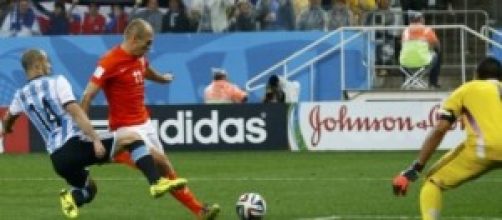Netherlands-Argentina, above all, rivalled Iran-Nigeria as the least entertaining game of the World Cup.Wesley Sneijder said in his post match interview that Argentina played the game with the intention of going to penalties. There may be an element of truth in this statement, but it’s hard to argue that the Netherlands did otherwise. Compared to the attacking spectacle we were given the night before, albeit one sided, one has to wonder what happened between two teams who’s strength is certainly in the attacking department. When one considers that Lionel Messi, Arjen Robben, Gonzalo Higuain, Robin van Persie, to name but a few, were hardly able to muster a shot on goal, it boggles the mind.
In fact as I watched and fought with my body not to fall asleep, I spent the game thinking about Argentina, what had they done to make it this far in the tournament?
It seems that given the talent at the disposal of Alejandro Sabella, the Albiceleste could and should be displaying an entirely different brand of football. Yet, if I had to choose a word to describe them, it would be efficient. They have not conceded a goal since their last group game against Nigeria, they have created a handful of chances but have rarely missed them and have made the final thanks to their solidity at the back. If you read that description without knowing the team in question, you would be forgiven for thinking of Germany.
Instead, the German side is the exact opposite, Joachim Loew has transformed Germany into a goal machine that plays with an extremely high defensive line and with Manuel Neuer as both its goalkeepr and sweeper.
However, more than anything, I thought about Messi, this was supposed to be his tournament, the one where he finally lifted himself to the level of Diego Maradona and guided the Argentinian national team to its first World Cup triumph in 28 years. While Messi has certainly shown moments of brilliance like his goals against Bosnia and Herzegovina and Iran, since the group stages he has failed to show up. Against the Netherlands he never once touched the ball in the opposition’s box, a stat that speaks volumes for how little influence Messi had on the match.
He has scored four goals so far in the World Cup, but all in the group stages. It’s hard to describe a player of Messi’s calibre as secondary, but that has been his role since the second round of the World Cup started, his only shining light, the assist for Angel Di Maria’s goal against Switzerland in the round of 16. What really came to light against the Netherlands, was that Argentina does have a leader in its team and that man is not Lionel Messi, but Javier Mascherano.
Mascherano has spent time at Barcelona, often criticised for his defensive frailties as a centre back. However he plays in that role for the Blaugrana because his position is occupied by a cantera product in Sergio Busquets.
For the Albiceleste, Sabella has given Mascherano his role back, and he has taken up the responsibility of leading the team with a charisma reminiscent of Fabio Cannavaro in 2006. He has been a brick wall and is an enormous chunk of the reason for why Argentina have been so solid at the back. Against the Netherlands, the most important moment of the match belonged to Mascherano, as he stopped Arjen Robben from scoring what certainly would have been the winner in the 90th minute with a monumental challenge in the box.
It was Javier Mascherano that gave a speech to his teammates as they circled around each other prior to the penalty shootout and it was Mascherano that spoke to the eventual hero of the match, Argentina’s goalkeeper Sergio Romero.
The cameras caught the moment that Mascherano took Romero to one side and told him: “Hoy, te convertìs en héroe” (today, you become a hero). He was right, Romero went on to save two penalties and in the process took Argentina to its first World Cup final since 1990, and just as it was 24 years ago in Italy, and four years prior in Mexico, they will face Germany in the final.
Maradona took Argentina to two World Cup finals, both against Germany, in 1986 and 1990, he won one and lost one, but the only factor the two matches have in common is that he didn't score in either of them. Messi has the chance to score in a World Cup final and lead Argentina to glory, and if he does so, this may be remembered as his World Cup.
But having watched and thought about Argentina, for me, the true leader and the man all Argentinians (including Messi and Sabella) will have to thank, at least for taking them this far, is Javier Mascherano.

